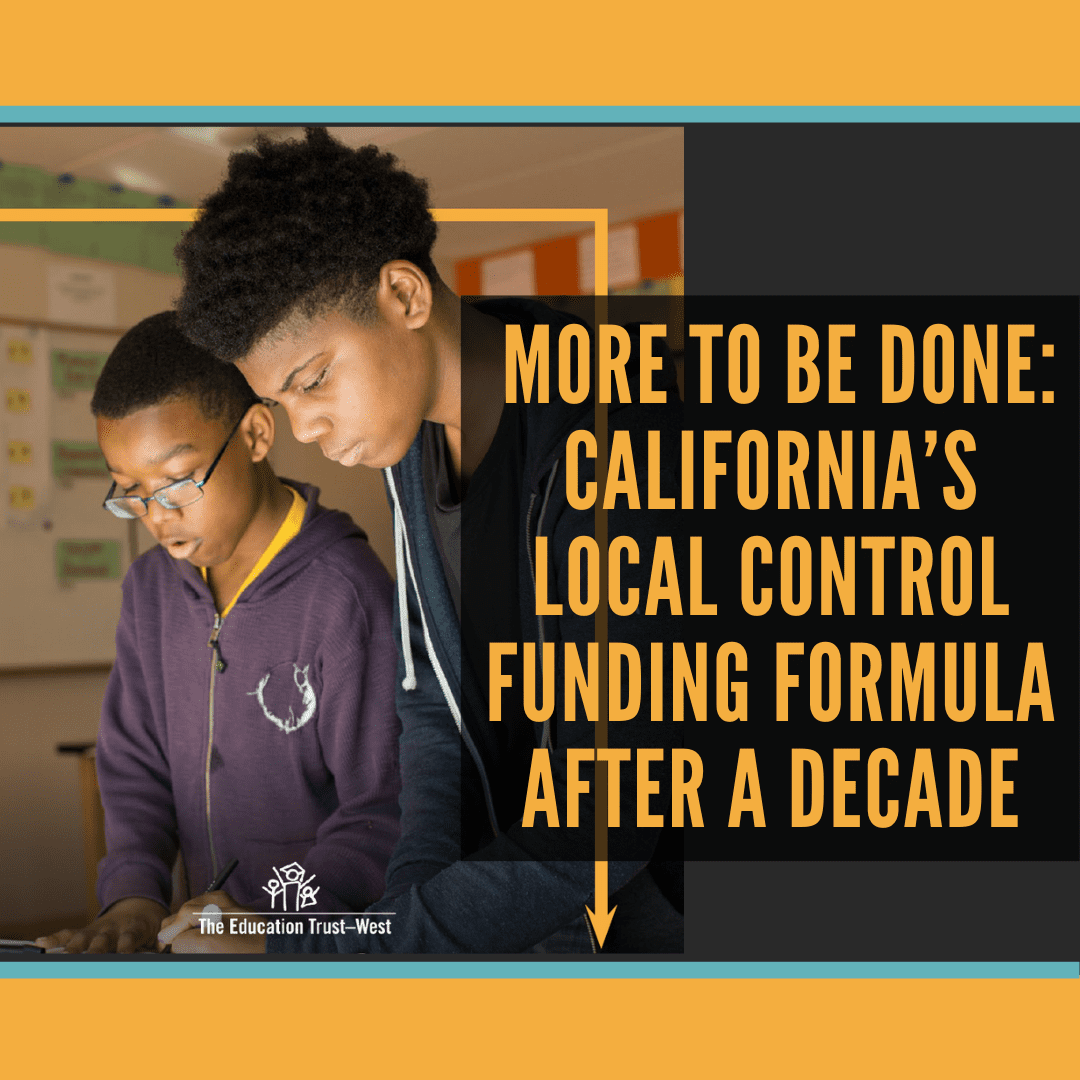For Immediate Release
November 9, 2023
Contact: Mariel Matze, [email protected], 650-380-1973
Ten Years Later, New Report Finds that California’s School Funding Formula Falls Short of Driving Equity
The Education Trust–West Calls for Legislative Hearings on the Unfinished Project of LCFF
Oakland, CA — Today, The Education Trust–West (Ed Trust–West) released More to Be Done: California’s Local Control Funding Formula After a Decade, a reflection on the nation’s first weighted school funding formula 10 years after its inception. The report finds that a decade later, shortcomings in the Local Control Funding Formula (LCFF) limit its potential to be used as a lever to close gaps in student opportunity and outcomes. Its findings led The Education Trust–West to call for legislative hearings on the successes and shortcomings of the policy, followed by a legislative package that comprehensively refines the policy to effectively close gaps in outcomes that harm marginalized students.
“LCFF was a step in the right direction in 2013, but it’s unfinished. California just released yet another year of alarmingly low, inequitable student achievement data—clearly, we’re overdue for some urgency,” says author Natalie Wheatfall-Lum, J.D. “Fixing LCFF will take a holistic approach, including the courage to address the harms of racism directly, especially for Black students. State leaders: students who have been and remain marginalized by our education system require bold, focused action from you now. It’s past time to make LCFF the tool for equity that it was always intended to be.”
Key Report Findings:
- In the years since LCFF passed:
- Academic outcomes for multilingual learners remain stagnant and the gaps between them and their peers who are proficient in English have widened.
- Persistently low student achievement data continues to show that many students of color, especially Black students, continue to be denied the support from schools and educators they need to succeed.
- Achievement and outcomes for students experiencing poverty have improved some, demonstrating that money matters in education, but even for these students, equity gaps have only slightly narrowed.
- LCFF led to more equitable funding distribution among school districts.
- LCFF’s limitations can be attributed to four major shortcomings of the law:
- By excluding student racial groups from the formula, policymakers have failed to leverage LCFF to address the lack of support for students of colors’, especially Black students’, academic success, thereby perpetuating their marginalization.
- LCAP accountability requirements have not required districts to be accountable for narrowing equity gaps for specific groups of students until recently.
- Community members like parents and teachers are too often insufficiently and ineffectively engaged, preventing them from participating in decisions that affect them, their children, and their students.
- A persistent lack of transparency in district spending makes it unclear whether supplemental funding for LCFF-targeted students is following them to their schools.
- As such, state leaders must take immediate action to:
- Modify the funding model to better target student racial groups.
- Prioritize results for marginalized students.
- Improve community engagement and shared decision-making.
- Increase the transparency of district spending decisions.
The report comes on the heels of state test scores showing further stagnation in alarmingly low test scores. Over the past ten years, progress in raising test scores for students experiencing poverty has been minimal, while progress along racial and linguistic lines has been virtually nonexistent.
About The Education Trust–West
The Education Trust—West is an evidence-driven advocacy organization committed to advancing policies and practices to dismantle the racial and economic barriers embedded in the California education system. For over two decades, Ed Trust—West has worked to improve racial equity in education by engaging diverse communities and increasing political and public will to build an education system where students of color and multilingual learners will thrive. For more information, see www.edtrustwest.org or follow us on X.




